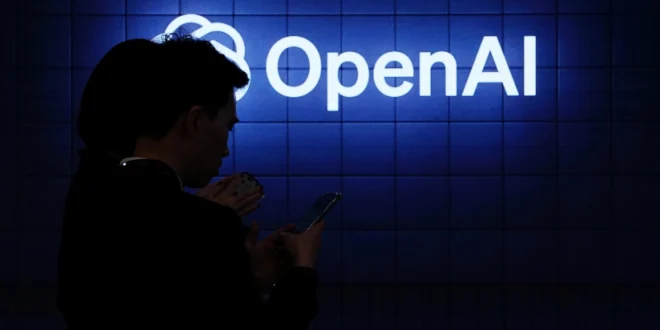The fight over who’ll innovate fastest and get the most commercial juice out of artificial intelligence is in the news nearly every day. Sam Altman won last week’s round, once again, with OpenAI’s splashy new, voice-enhanced GPT-4o.
The other fight over AI is political, and here the story is different. As recently as last fall, Altman and other AI princes were toasted in Washington. No more. What started off with polite symposia about “guardrails” and “best practices” is turning into a struggle over power between the worlds of tech and politics. Watch it get messier and louder.Every previous tech revolution, the titans of Silicon Valley and Seattle also enjoyed Washington’s embrace before feeling the hard chill. This just happened a lot faster with AI.
Memories are short on the East Coast. The dominance of tech giants that brought the government down on software (Microsoft 1990s), social media and privacy (Meta 2010s on) and search (Google now) has put Washington on edge with AI barely 18 months after OpenAI’s unveiled its breakthrough ChatGPT model.
When you talk to the key players in tech politics here in California, you feel it. They are bracing and staffing for trouble. They’ll have to thread multiple needles on regulations. They flinch at talk of antitrust scrutiny. More than anything, they express frustration — ever so diplomatically in public — that Washington’s looking in the backward mirror at tech’s past sins and failing to appreciate that, as you often hear, Come on, this is an entirely new kind of technology … a computer that thinks! You have to think about it differently.
“There is a risk that people think of this as social media 2.0 because its first public manifestation was a chat bot,” Kent Walker, Google’s president of global affairs, tells me over a conversation at the search giant’s offices here.
True, Washington is an analog town that doesn’t quite get technology. But the problem for Silicon Valley is that this isn’t really about the technology. Who knows what AI will do and change. This fight is about who’ll benefit most from this transformation — and what if anything Washington should do to shape the outcome. Huge economic bets are getting placed that someone must rationally expect to pay off big, reshaping the socio-economy. And while Washington may well be fighting the last tech war, the likeliest winners from AI, on current trends, are also from the past: Microsoft, Google, Amazon and Meta, possibly joined by a few newcomers, including OpenAI (now effectively a subsidiary of Microsoft).
On Capitol Hill and in the White House, that alone breeds growing suspicion and defensiveness. Altman and others, including from another prominent AI startup Anthropic, weighed in with ideas for the Biden administration’s sweeping executive order last fall on AI safety and development. But that didn’t earn them lasting good will. “In no way did the idea come from them,” says Ben Buchanan, the senior adviser for AI at the White House who was one of the drafters of the order, referring to the tech industry and suggestions that the rules were written in ways that help existing players. “I reject wholeheartedly the notion of regulatory capture.”
The biggest fear for Big Tech’s political antagonists? That AI will — yet again — concentrate power in a few hands. Not just in terms of economic spoils but the power to remake the world in ways well beyond the control of Washington.
“There is a winner take all dimension” to the AI revolution, Rohit Chopra, who directs the Consumer Financial Protection Bureau, tells me. “We struggle to see how it doesn’t turn, absent some government intervention, into a market structure where the foundational AI models are not dominated by a handful of the big tech companies.”
Saying “star struck” policymakers across Washington have to get over their “eyelash batting awe” over new tech, Chopra predicts “another chapter in which big tech companies are going to face some real scrutiny” in the near future, especially on antitrust.Lina Khan, the FTC’s head who has used the antitrust cudgel against big tech liberally, has sounded the warnings. “There is no AI exemption to the laws on the books,” she said last September. The other day, a senior Hill aide mentions Microsoft’s huge investments in OpenAI, France’s Mistral, in the United Arab Emirates and elsewhere, and asks bluntly, “When is the FTC going to light up Microsoft?”
People out on the West Coast quietly fume about having to grapple with Washington. The tech crowd says the only fight that matters is the AI race against China and each other. But they are handling politics with care, all too aware of the risks.
Listen to several of the most important players.
“The U.S. made a concerted effort to develop more guardrails more quickly than before,” says Nick Clegg, the former British deputy prime minister who has navigated politics for Meta since 2018. “That’s a good thing. [But] don’t try to micromanage the technology itself.”
“My hope is we can approach that in a practical spirit where we work through a lot of important tradeoffs,” says Walker, a thoughtful lawyer and Clegg’s counterpart at Google, who has been at the company for nearly two decades and fought all the previous battles in Washington.
“I’ve been freakishly surprised by how OK it’s been,” adds Jack Clark, the plainspoken cofounder and policy chief at Anthropic, of Washington’s response.
He notes that the U.S. left it to the Chinese to set the standards for 5G and the Europeans to take the lead on privacy and antitrust in the previous Internet wave. Both were a mistake, from the point of view of American interests. The administration’s trying to get out in front on AI, looking to seize a geopolitical advantage with the early executive order and by continuing to limit Chinese access to the new technology.
“I firmly believe that what this looks like is some parts of the U.S. government developing some testing and measurement standards for the AI systems that are frontier, which are all American, to be clear, and will be so for years until the effect of export controls on China lessens,” Clark says. “And then you can export a testing and standards regime around the world. America can do this.”
Testing standards for AI are easy things to find agreement on. Safety as well, as long as those rules don’t favor one or another budding AI player. No one wants the technology to help rogue states or groups. Silicon Valley is on America’s side against China and even more concerned about the long regulatory arm of the EU than Washington.
The tussle over intellectual property is bigger, and publishers and content creators are engaged in it through lawsuits against or deals with AI developers. Some clarity on ownership of data — the most valuable commodity for the development of AI — would be helpful as well.
Most of these issues should be handled by Congress. Senate Majority Leader Chuck Schumer got a lot of headlines for the bipartisan AI roadmapreleased last week that proposed new investment and a blueprint for laws. But he didn’t propose any legislation since everyone knows none are likely to pass before the election, and if the Hill stays this dysfunctional anytime soon after.
Which leaves Washington to wave the blunt but still hypothetical antitrust cudgel. In their battle of narratives against “concentration of power,” Silicon Valley can wield two arguments that have merit to them: the raging competition around AI and how it’ll democratize tech and the economy.
On the worries about the winner-take-all world of AI, how can there be a monopoly being built when you have at least five large companies fighting it out, not to forget the Chinese? “Generative AI is a competitive and dynamic sector,” says Google’s Walker.
And while a couple huge winners emerged from the previous Web revolutions, countless other businesses did as well. The same is already happening with AI. “The centralized heavy lifting is combined with quite widespread democratization of the tools,” Clegg tells me at Meta’s headquarters in Menlo Park earlier this year. In every industry, from big to small, companies are developing their own AI tools, taking advantage of the open source software code available widely. “The key is whether we are democratizing access to the technology so everyone can benefit,” says Chris Lehane, OpenAI’s new vice president of public works.
That’s all true to a degree. But also, clearly the incumbent tech powers have a huge advantage over everyone else. Only a few companies can spend the billions on GPU chips from Nvidia, the engineers coming out of MIT and the massive amounts of electricity required to run large-language models. The better-known startups are in bed with them — OpenAI and Mistral with Microsoft, Anthropic with Google and Amazon. Smaller players are getting squeezed out — reinforcing concerns that AI will simply extend the age of tech oligopolies, in a replay of the desktop, social and search revolutions.
Chris Dixon, general partner at the venture capital giant Andreessen Horowitz, was in Washington the other week to promote his new book Read Write Own on the future of the Internet. For self-interested reasons, venture capitalists want to open up the space in Silicon Valley for new entrants that they can invest in and profitably exit from. Their arguments for a more open market will resonate politically. The Biden administration’s first move on AI “was a wakeup call for the Valley,” he says. “The era of the libertarian sandbox is over.” The coming of AI offers a chance to revive competition and innovation, he adds, through more robust government action. “Is tech just five big companies? Or is the tech economy going to be a vibrant economy?”
Tech companies are hiring up for coming antitrust fights and other tussles with the government. OpenAI this spring brought in Lehane, the former Al Gore aide and a respected Silicon Valley veteran who navigated Airbnb through difficult political waters in his long stint there. He’ll be making the case for building a larger AI infrastructure as well as supporting on politics and media. The legacy giants are shifting their lobbying efforts, seeking to shape the debate on regulation and deflect the focus to China.
The political class has limited options, and the tradeoffs are imperfect. Washington can make life difficult for the giants. Google has spent years now fighting antitrust and other challenges to its business practices, but that’s had no to limited impact on its bottom line.
At least the debate over regulation has started far earlier in the life cycle of AI than it did for previous technological upheavals. Boards of wise peopleare thinking about not yet fully known future applications and problems. But let’s be honest, the two sides of the country are spending a lot of their time talking past each other.
One thing’s known for certain: The politics of AI started to get heated in the past year and are only going to become more so.
 Geostrategic Media Political Commentary, Analysis, Security, Defense
Geostrategic Media Political Commentary, Analysis, Security, Defense





